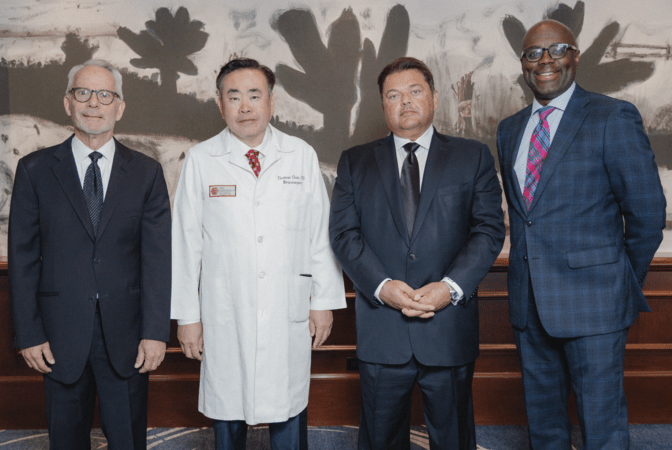
- All Instrument Types
- Indices
- Equities
- ETFs
- Funds
- Commodities
- Currencies
- Crypto
- Bonds
- Certificates
Please try another search

NeOnc Wins Drug Delivery Technology of the Year: A New Era in Cancer Treatment
California-based NeOnc's groundbreaking nasal spray technology, which uses the olfactory nerve pathway to deliver life-saving cancer drugs directly to the brain, has won the Drug Delivery Technology of the Year award, marking a significant advancement in cancer treatment.

Nasal sprays have long been used to treat allergies. In more recent years, they’ve been successfully used to treat seizures and even depression. But now, California biotechnology company NeOnc has developed an all-new nasal spray delivery system — and this one may be able to treat cancer.
NeOnc’s system recently won a prestigious Drug Delivery Technology of the Year award, indicating that it’s gaining the confidence of medical professionals. While it’s still relatively early in its clinical trial phase, this nasal delivery system might just be what the world has been waiting for.
Like many groundbreaking biotechnologies, this delivery system takes an ordinary bodily function and uses it to accomplish something extraordinary. This one starts with your sense of smell. In a nutshell, it takes the chemical process that happens when you smell a flower and uses it to deliver life-saving cancer drugs to your brain.
It might be tempting to dismiss NeOnc’s intranasal delivery system as too good to be true. However, when you take a closer look at the company itself, you can see that for founder and CEO Dr. Thomas Chen — one of the world’s top neurosurgeons — it’s a culmination of his life’s work.
As director of surgical neuro-oncology and professor of neurosurgery and pathology at the University of Southern California, Dr. Chen divides his time between performing complex brain and spine surgeries, teaching the next generation of neurosurgeons, and working on new technologies to advance the field.
Dr. Chen explains that when swallowed or injected, cancer medications have limited effectiveness on the brain thanks to something called the blood-brain barrier. “The blood-brain barrier is something we all have,” he says. “It keeps various pathogens or compounds that may have entered our circulation away from our brain.”
That’s normally a good thing — but not if you’re trying to treat brain cancer. “We're trying to get drugs or other biologics to the target, and the blood-brain barrier’s preventing that from happening,” says Dr. Chen. “Now, what we're trying to do is something that nobody else is doing for brain cancer. And that is to bypass the blood-brain barrier.”
That bypass happens through intranasal delivery. Patients wear a nebulizer and nose mask that allows them to inhale aerosolized drug molecules for about 20 minutes at a time.
“You're inhaling the compound, and you're letting your cranial nerves deliver it to the brain,” says Dr. Chen. “In our brain, we have 12 cranial nerves. The first cranial nerve is called the olfactory nerve, and that's the nerve that we inhale from.”
When a patient uses the intranasal delivery system, small molecules of the drug are pulled into the olfactory nerve pathway. As long as the molecules are small enough, they can be picked up by cerebrospinal fluid instead of being blocked by the blood-brain barrier.
Once inside the brain, they can then effectively target the cancer. As an added benefit, patients can administer the treatments themselves from the comfort of home.
If you’re skeptical, you’re not alone. However, Dr. Chen says the existing data suggests that this might be the very beginning of a new era in cancer treatment.
“It’s a game-changing process,” he says. “Sometimes, when things are very game-changing, people scratch their heads and say it's hard to believe. But all of our trials are enrolling humans, and the results look very, very good so far.”
What do good results look like? Thus far, the delivery system is accomplishing the original goal of extending the lives of people with terminal brain cancer — but in a few cases, the results are even better than that. “We have had a couple of patients whose tumors went away on my scan,” Dr. Chen says, “and we're still following these patients.”
You might be wondering how long it will be before NeOnc’s intranasal delivery system will be available to the public. Currently, the delivery system is in phase 2A clinical trials with the FDA.
"We are thrilled to have a fast-track designation," exclaims NeOnc Executive Chairman Amir F. Heshmatpour. "Once we complete Phase 2A, we anticipate the FDA will request a Phase 2B with approximately 60 patients. Following this, we are confident our groundbreaking drug will receive approval and make its way to the market."
In the unpredictable realm of clinical trials, certainty is rare. Yet with NeOnc's recent prestigious accolades and the remarkable performance of its innovative delivery system, this new technology is poised to revolutionize cancer treatment, saving countless lives and instilling hope in millions.
This article is for informational purposes only and does not substitute for professional medical advice. If you are seeking medical advice, diagnosis or treatment, please consult a medical professional or healthcare provider.




